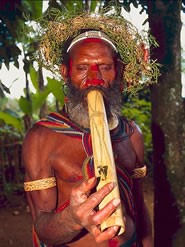Huli in Papua New Guinea

Photo Source:
COMIBAM / Sepal
|
Send Joshua Project a map of this people group.
|
| People Name: | Huli |
| Country: | Papua New Guinea |
| 10/40 Window: | No |
| Population: | 288,000 |
| World Population: | 288,000 |
| Primary Language: | Huli |
| Primary Religion: | Christianity |
| Christian Adherents: | 88.00 % |
| Evangelicals: | 19.00 % |
| Scripture: | Complete Bible |
| Ministry Resources: | Yes |
| Jesus Film: | Yes |
| Audio Recordings: | Yes |
| People Cluster: | New Guinea |
| Affinity Bloc: | Pacific Islanders |
| Progress Level: |
|
Introduction / History
For thousands of years the Huli people have lived in both the highlands and lowlands of Papua New Guinea's Hela Province. Most live in the Tagari River Basin. They were not known to Europeans until 1934 when 50 of them were killed by two European gold explorers.
What Are Their Lives Like?
The Huli people are aware of their history, and family members know the names of their ancestors. They have their own folklore.
Their homeland in the Tagari River Basin has excellent weather and enough rain for abundant food sources. There are forests, marshes, grasslands, scrub brush and other environments for them to harvest food. The Huli people have made drainage canals, walking paths and defense fortifications for their needs.
Huli men are known for their elaborate headdresses, costumes and body paintings which mimic the looks of local animals and bush spirits.
What Are Their Beliefs?
Though they are Christianized, the Huli people are often tempted to return to their animistic beliefs.
What Are Their Needs?
The younger generation need training in areas that will get them urban jobs.
Prayer Points
Pray for a Holy Spirit revival to bless Huli churches in such a way that they will be thrust out to reach unreached peoples in Southeast Asia.
Pray for Huli disciples who will make more disciples.
Pray for the Lord to bless their agricultural efforts in such a way they will understand him to be both powerful and loving.
There are recordings in the Huli language. Pray these will become easily available to every Huli family.